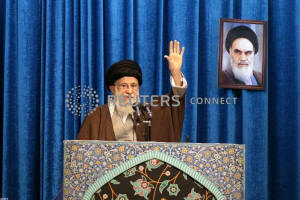Iran can take fight beyond its borders, Khamenei says after U.S. strike,
unrest
 Send a link to a friend
Send a link to a friend
 [January 17, 2020]
By Parisa Hafezi [January 17, 2020]
By Parisa Hafezi
DUBAI (Reuters) - The Revolutionary Guards
can take their fight beyond Iran's borders, the supreme leader said on
Friday, responding to the U.S. killing of a top general and to unrest at
home over the accidental downing of an airliner.
In his first Friday prayers sermon in eight years, Ayatollah Ali
Khamenei also told thousands of Iranians who chanted "Death to America"
that European states could not be trusted after they launched a nuclear
agreement dispute mechanism.
The measure could lead to U.N. sanctions being reimposed.
"Resistance must continue until the region is completely freed from the
enemy's tyranny," Khamenei said, in a reference to the United States
that renewed his call for U.S. troops to leave neighboring Iraq and the
wider Middle East.
Washington's withdrawal in 2018 from Tehran's nuclear deal with world
powers and the reimposition of U.S. sanctions has triggered an
escalation in tensions over several months that briefly led to open
conflict in January.

U.S. President Donald Trump ordered the killing in a drone strike on
Jan. 3 of Qassem Soleimani, commander of the Quds Force, a unit of the
Revolutionary Guards responsible for expanding Iran's influence abroad.
He built up regional militias that Washington has blamed for attacks on
U.S. forces.
Iran responded with missile strikes on U.S. targets in Iraq on Jan. 8,
injuring although not killing U.S. troops.
"The fact that Iran has the power to give such a slap to a world power
shows the hand of God," said Khamenei, in a reference to the strikes,
adding that the killing of Soleimani showed Washington's "terrorist
nature".
"The Quds Force is a humanitarian organization with human values that
protects people across the region," Khamenei said. "They are fighters
without borders."
In the tense aftermath of Iran's missile strikes on U.S. targets, when
Iranian forces expected U.S. reprisals, the Guards' air defenses shot
down a Ukrainian airliner in error.
It took days to admit the mistake, a delay that sparked protests across
Iran that sometimes met a violent crackdown.
'AMERICAN CLOWNS'
Trump sent tweets in Farsi and English to support the demonstrators,
drawing a sharp response from Khamenei.
"These American clowns who lie and say they are with the Iranian people
should see who the Iranian people are," he said on Friday.
[to top of second column]
|

Iran's Supreme Leader Ayatollah Ali Khamenei gestures as he delivers
Friday prayers sermon, in Tehran, Iran January 17, 2020. Official
Khamenei website/Handout via REUTERS

Khamenei called for national unity and said Iran's "enemies", a term
usually used to refer to the United States and its allies, had tried
to use the downing of Ukraine International Airlines flight 752 to
shift attention from the killing of Soleimani.
Khamenei described the crash as a tragedy and called for steps to
ensure there was no repeat.
The funeral of Soleimani, long portrayed as a national hero but seen
by the West as a ruthless adversary, had brought huge numbers of
Iranian mourners to the streets.
But scenes of mourning for Soleimani were followed by four days of
protests over the plane disaster, when demonstrators chanted "Death
to Khamenei" and "Clerics get lost".
To quell the demonstrations, riot police were sent onto the streets
in force, lining up outside universities that were a focus for the
protests. Video footage online showed protesters were beaten and
also recorded gunshots and blood on the streets.
Iran's police denied firing at protesters and said officers had been
ordered to show restraint.
Two months ago, the authorities launched a bloody crackdown on
protests that erupted over fuel price hikes, which have hurt
ordinary Iranians already feeling the squeeze of U.S. sanctions
Washington reimposed sanctions after it withdrew from Tehran's
nuclear pact with world powers. Since then, Tehran has scaled back
on its commitments to the deal, including saying it would stop
observing limits on uranium enrichment.
Britain, France and Germany have subsequently launched a dispute
mechanism in the deal, which starts a diplomatic process that could
lead to the reimposition of U.N. sanctions.

"These European countries cannot be trusted. Even their negotiations
with Iran are full of deceit," Khamenei said.
(Reporting by Parisa Hafezi and Babak Dehghanpisheh; Editing by
Edmund Blair and Gareth Jones)
[© 2020 Thomson Reuters. All rights
reserved.] Copyright 2020 Reuters. All rights reserved. This material may not be published,
broadcast, rewritten or redistributed.
Thompson Reuters is solely responsible for this content. |